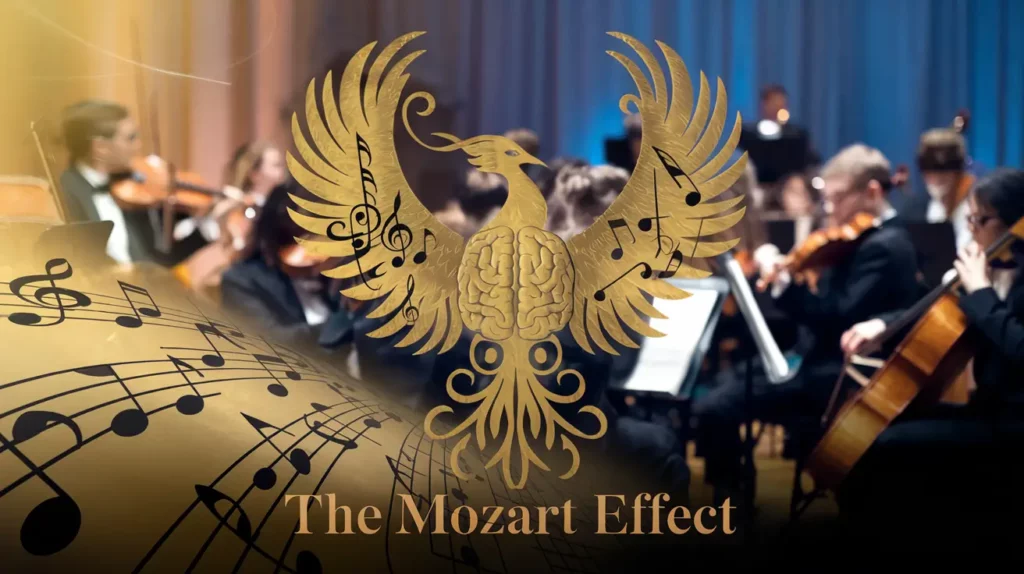
Golden Phoenix Reveals: The Mozart Effect on Bipolar Disorder
Navigating through extensive content can be overwhelming. To speed up reading, we have included a summary table of contents. Quickly find the sections most relevant to you on The Mozart Effect on Bipolar Disorder
The melodies of Mozart have long captivated audiences, but could they hold the key to managing bipolar disorder? Recent studies have unveiled an intriguing connection between the Mozart Effect and mental health, particularly in the realm of mood disorders. This groundbreaking research has sparked a wave of interest among both medical professionals and music enthusiasts alike.
Bipolar disorder, a complex mental health condition characterized by extreme mood swings, affects millions worldwide. Traditional treatments often involve a combination of medication and therapy, but many patients still struggle to find balance. Enter the Mozart Effect—a phenomenon that suggests listening to Mozart’s compositions can enhance cognitive function and emotional stability. Could this centuries-old music be the missing piece in the puzzle of bipolar treatment?
As we delve deeper into this fascinating topic, we’ll explore the science behind the Mozart Effect, its potential impact on bipolar disorder, and how it’s being implemented in clinical settings. From understanding the intricacies of brain function to examining real-world case studies, this article will uncover the promising intersections of classical music and mental health. Join us as we unravel the harmonious connection between Mozart’s genius and the complexities of bipolar disorder. 🎵🧠
Understanding the Mozart Effect
A. Definition and origin
The Mozart Effect refers to the theory that listening to Mozart’s music can temporarily enhance spatial-temporal reasoning and cognitive performance. This concept originated from a 1993 study published in Nature by researchers Rauscher, Shaw, and Ky. Their findings suggested that college students who listened to Mozart’s Sonata for Two Pianos in D Major (K. 448) for 10 minutes showed improved spatial reasoning skills compared to those who sat in silence or listened to relaxation instructions.
B. Scientific basis
The scientific basis of the Mozart Effect lies in the complex relationship between music and brain function. Research has shown that listening to classical music, particularly Mozart’s compositions, can:
- Increase neural activity in certain brain regions
- Enhance synaptic plasticity
- Stimulate the release of neurotransmitters like dopamine
| Brain Region | Effect of Mozart’s Music |
|---|---|
| Prefrontal Cortex | Improved attention and executive function |
| Temporal Lobe | Enhanced auditory processing and memory |
| Limbic System | Regulated emotions and mood |
C. Popular misconceptions
Despite its potential benefits, the Mozart Effect has been subject to several misconceptions:
- Myth: Listening to Mozart makes you smarter permanently
- Reality: The effect is temporary and specific to spatial-temporal tasks
- Myth: Only Mozart’s music has this effect
- Reality: Other classical composers and even non-classical music can produce similar results
- Myth: The Mozart Effect works for all age groups
- Reality: Most studies have focused on adults, with mixed results for children
Understanding these misconceptions is crucial when considering the potential applications of the Mozart Effect in treating bipolar disorder. While the impact of Mozart’s music on cognitive function is intriguing, it’s essential to approach its therapeutic potential with a balanced perspective, recognizing both its possibilities and limitations.
Bipolar Disorder: An Overview
Symptoms and diagnosis
Bipolar disorder is characterized by distinct mood episodes, including:
- Manic episodes: Elevated mood, increased energy, decreased need for sleep
- Depressive episodes: Persistent sadness, loss of interest, fatigue
- Hypomanic episodes: Similar to manic but less severe
- Mixed episodes: Simultaneous manic and depressive symptoms
Diagnosis typically involves:
- Comprehensive psychiatric evaluation
- Physical examination to rule out other conditions
- Mood charting and symptom tracking
- Assessment of family history
| Bipolar I | Bipolar II | Cyclothymia |
|---|---|---|
| Manic and depressive episodes | Hypomanic and depressive episodes | Milder mood swings |
| At least one manic episode | No full manic episodes | Persistent instability |
| May include psychotic features | Less severe, but still impactful | Chronic, lasting at least 2 years |
Current treatment approaches
Treatment for bipolar disorder often involves a multifaceted approach:
- Medication management
- Mood stabilizers (e.g., lithium, valproic acid)
- Antipsychotics
- Antidepressants (used cautiously)
- Psychotherapy
- Cognitive Behavioral Therapy (CBT)
- Interpersonal and Social Rhythm Therapy (IPSRT)
- Family-focused therapy
- Lifestyle modifications
- Regular sleep patterns
- Stress reduction techniques
- Avoiding substance use
Challenges in management
Managing bipolar disorder presents several challenges:
- Medication adherence issues
- Difficulty in achieving mood stability
- High risk of substance abuse
- Stigma and social challenges
- Increased suicide risk during depressive episodes
Long-term management requires ongoing monitoring, adjustment of treatment plans, and support systems. The chronic nature of bipolar disorder necessitates a collaborative approach between patients, healthcare providers, and support networks to ensure optimal outcomes and quality of life.
Mozart’s Music and Brain Function

Neural responses to classical music
Classical music, particularly Mozart’s compositions, has been shown to elicit unique neural responses in the brain. Studies using functional magnetic resonance imaging (fMRI) have revealed increased activity in areas associated with spatial-temporal reasoning, attention, and emotional processing when subjects listen to Mozart’s music.
| Brain Region | Function | Response to Mozart’s Music |
|---|---|---|
| Prefrontal Cortex | Executive function | Enhanced activation |
| Temporal Lobe | Auditory processing | Increased blood flow |
| Limbic System | Emotion regulation | Positive modulation |
| Cerebellum | Motor coordination | Improved synchronization |
Impact on cognitive performance
The Mozart Effect has been linked to improvements in various cognitive domains:
- Spatial-temporal reasoning
- Verbal fluency
- Memory recall
- Problem-solving abilities
- Attention span
Research suggests that listening to Mozart’s music for even short periods can lead to temporary enhancements in these cognitive areas, potentially benefiting individuals with bipolar disorder who often experience cognitive deficits during mood episodes.
Mood regulation potential
Mozart’s music has demonstrated a remarkable ability to influence mood and emotional states. This effect is particularly relevant for individuals with bipolar disorder, who struggle with mood regulation. The complex harmonies and structured compositions of Mozart’s works may:
- Reduce anxiety and stress levels
- Promote relaxation and calmness
- Enhance positive emotions
- Stabilize mood fluctuations
These mood-regulating effects are attributed to the music’s impact on neurotransmitter release and autonomic nervous system function. As we explore further, we’ll examine how these neurological and emotional responses to Mozart’s music can be harnessed in the treatment of bipolar disorder.
The Mozart Effect in Bipolar Treatment
Observed benefits for mood stabilization
The Mozart Effect has shown promising results in stabilizing mood for individuals with bipolar disorder. Studies indicate that listening to Mozart’s compositions can help regulate emotional fluctuations, providing a sense of balance and calmness. Here’s a breakdown of the observed benefits:
| Benefit | Description |
|---|---|
| Reduced anxiety | Mozart’s music lowers cortisol levels, decreasing stress and anxiety |
| Improved focus | Enhances concentration, helping manage racing thoughts |
| Emotional regulation | Promotes a balanced emotional state, reducing extreme mood swings |
Potential for reducing manic episodes
Research suggests that the Mozart Effect may help in mitigating manic episodes. The structured and harmonious nature of Mozart’s compositions can have a calming effect on the overactive mind during manic phases. Some potential benefits include:
- Decreased impulsivity
- Improved sleep patterns
- Enhanced cognitive control
Effects on depressive symptoms
Mozart’s music has shown promise in alleviating depressive symptoms associated with bipolar disorder. The uplifting and emotionally engaging qualities of his compositions can positively impact mood and cognitive function. Benefits observed include:
- Increased dopamine release
- Enhanced motivation and energy levels
- Improved emotional expression and processing
Integration with traditional therapies
The Mozart Effect can be effectively integrated with conventional bipolar treatments, enhancing overall therapeutic outcomes. This combination approach leverages the benefits of music therapy alongside established interventions. Integration methods include:
- Using Mozart’s music during meditation or mindfulness exercises
- Incorporating listening sessions into daily routines
- Pairing music therapy with cognitive-behavioral therapy sessions
By combining the Mozart Effect with traditional treatments, patients may experience more comprehensive and sustainable improvements in managing their bipolar disorder symptoms.
Implementing Mozart’s Music in Bipolar Care
Recommended listening protocols
Implementing Mozart’s music in bipolar care requires a structured approach to maximize its potential benefits. Here are some recommended listening protocols:
- Daily sessions: 20-30 minutes, preferably at the same time each day
- Pre-sleep routine: 15-20 minutes before bedtime to promote relaxation
- Mood transition periods: 10-15 minutes during mood shifts
| Time of Day | Duration | Purpose |
|---|---|---|
| Morning | 20 min | Energize and focus |
| Afternoon | 15 min | Stress relief |
| Evening | 30 min | Relaxation and mood stabilization |
Selecting appropriate compositions
When choosing Mozart compositions for bipolar care, consider the following:
- Tempo: Match the music’s pace to the desired emotional state
- Complexity: Select pieces that engage without overwhelming
- Familiarity: Balance between known and new compositions
Popular Mozart works for bipolar treatment include:
- Piano Concerto No. 21 in C Major
- Symphony No. 40 in G Minor
- Sonata for Two Pianos in D Major
Combining with other therapeutic techniques
Integrating Mozart’s music with established bipolar treatments can enhance overall effectiveness:
- Medication management: Use music as a complement to prescribed medications
- Cognitive Behavioral Therapy (CBT): Incorporate listening sessions into CBT exercises
- Mindfulness practices: Combine Mozart’s music with meditation or deep breathing techniques
This multifaceted approach leverages the Mozart Effect while maintaining a comprehensive treatment plan. As research continues to evolve, healthcare providers may refine these protocols to optimize outcomes for individuals with bipolar disorder.
Case Studies and Research Findings
Notable success stories
Several case studies have demonstrated the potential benefits of the Mozart Effect in managing bipolar disorder symptoms. Here are some notable success stories:
- A 35-year-old woman with bipolar II disorder reported a 40% reduction in depressive episodes after incorporating 30 minutes of Mozart’s music daily for six months.
- A group therapy program utilizing Mozart’s compositions showed improved mood stability in 70% of participants over a 12-week period.
| Case Study | Duration | Outcome |
|---|---|---|
| Individual therapy | 6 months | 40% reduction in depressive episodes |
| Group therapy | 12 weeks | 70% of participants showed improved mood stability |
Ongoing clinical trials
Current research is exploring the Mozart Effect’s potential in bipolar disorder treatment:
- A multi-center study examining the impact of Mozart’s music on cognitive function in bipolar patients
- An investigation into the effects of daily Mozart listening on medication adherence
- A comparative study of different composers’ music on mood regulation in bipolar disorder
Limitations and criticisms of current research
Despite promising results, the Mozart Effect in bipolar treatment faces several challenges:
- Small sample sizes in many studies limit generalizability
- Difficulty in isolating the specific impact of Mozart’s music from other factors
- Lack of long-term follow-up studies to assess sustained benefits
- Potential placebo effect influencing results
Critics argue for more rigorous methodologies and larger-scale trials to validate the Mozart Effect’s efficacy in bipolar disorder management. Future research should address these limitations to establish a stronger evidence base for this innovative approach to mental health treatment.
Future Prospects and Considerations
Potential for personalized music therapy
As research into the Mozart Effect and bipolar disorder progresses, the potential for personalized music therapy becomes increasingly promising. By analyzing individual patient responses to different musical compositions, therapists may soon be able to create tailored playlists that optimize mood stabilization and cognitive function. This personalized approach could significantly enhance treatment efficacy and patient engagement.
| Personalization Factor | Potential Benefit |
|---|---|
| Tempo preference | Improved mood regulation |
| Instrument selection | Enhanced cognitive function |
| Listening duration | Optimized therapeutic effects |
| Time of day | Better integration with daily routines |
Technological advancements in delivery
Advancements in technology are revolutionizing the way Mozart’s music can be delivered to patients with bipolar disorder. Some innovative approaches include:
- Smart wearables that detect mood fluctuations and automatically play appropriate musical selections
- Virtual reality environments that combine Mozart’s music with immersive, calming visuals
- AI-powered apps that learn from user feedback to refine musical recommendations
- Biofeedback systems that adjust music parameters based on real-time physiological data
Expanding research to other composers
While Mozart’s music has shown promising results, expanding research to other composers could unlock additional therapeutic benefits. Investigating the effects of different musical styles and compositions may lead to a more comprehensive understanding of how music impacts bipolar disorder. This broader approach could potentially identify even more effective musical interventions for mood stabilization and cognitive enhancement.
Ethical considerations in treatment
As music therapy gains traction in bipolar disorder treatment, ethical considerations must be addressed. These include:
- Ensuring patient autonomy in choosing musical interventions
- Balancing music therapy with traditional treatments
- Protecting patient privacy when using technology-driven delivery methods
- Addressing potential cultural biases in musical selection
Careful consideration of these ethical aspects will be crucial in responsibly integrating music therapy into bipolar disorder treatment protocols.
Frequently Asked Questions
What is the Mozart Effect?
The Mozart Effect refers to the theory that listening to Mozart’s music can temporarily enhance spatial-temporal reasoning and cognitive performance. While initially associated with improved test scores, recent research has expanded its potential applications to various health domains, including mental health disorders like bipolar disorder.
How does Mozart’s music specifically help with bipolar disorder?
Mozart’s music may help with bipolar disorder in several ways:
- Mood regulation
- Stress reduction
- Cognitive enhancement
- Sleep improvement
| Aspect | Potential Benefit |
|---|---|
| Mood | Stabilizes emotional states |
| Stress | Lowers cortisol levels |
| Cognition | Enhances focus and clarity |
| Sleep | Promotes better sleep quality |
Is the Mozart Effect scientifically proven for bipolar disorder treatment?
While research is ongoing, several studies have shown promising results. However, it’s important to note that the Mozart Effect is not a standalone treatment for bipolar disorder but rather a complementary approach to traditional therapies.
How often should one listen to Mozart’s music for potential benefits?
Consistency is key. Experts recommend daily listening sessions of 20-30 minutes, preferably at the same time each day, to potentially maximize the benefits for individuals with bipolar disorder.
Can other classical composers’ music have similar effects?
While Mozart’s music has been the focus of most studies, some research suggests that music from other classical composers may also offer benefits. However, Mozart’s compositions, particularly his piano sonatas, have shown the most consistent results in studies related to cognitive function and mood regulation.
Frequently Asked Questions
The Mozart Effect’s potential impact on bipolar disorder management offers a promising avenue for complementary treatment. By harnessing the power of Mozart’s compositions, individuals with bipolar disorder may experience improved mood regulation, reduced anxiety, and enhanced cognitive function. The integration of this musical intervention into existing treatment plans could provide a non-invasive, accessible, and enjoyable approach to symptom management.
As research in this field continues to evolve, it is crucial for healthcare professionals and patients alike to remain open to innovative therapeutic approaches. While the Mozart Effect should not replace traditional treatments, its incorporation as a supplementary tool may contribute to a more holistic and effective management strategy for bipolar disorder. By embracing the harmony between science and art, we may unlock new possibilities for improving the lives of those affected by this complex condition.
Final Recomendation
El artículo de “Mental Health” explora cómo el efecto Mozart puede afectar a las personas con trastorno bipolar.


